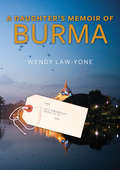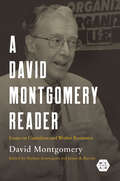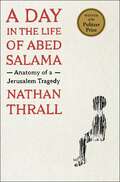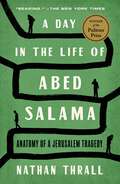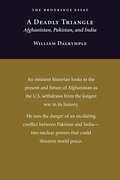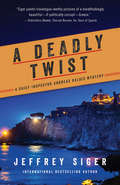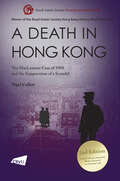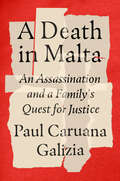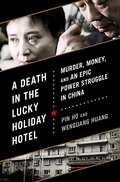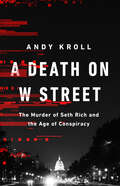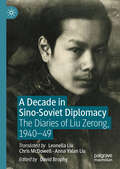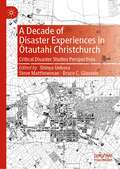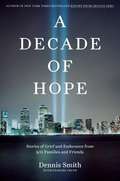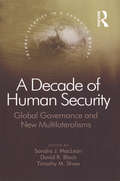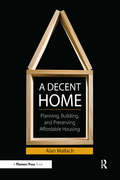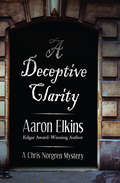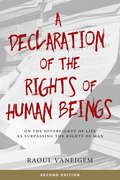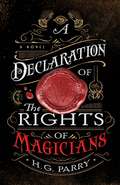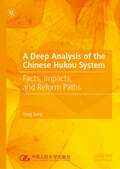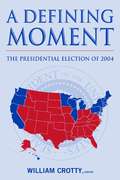- Table View
- List View
A Daughter's Memoir of Burma
by Wendy Law-Yone David I. SteinbergWendy Law-Yone was fifteen at the time of Burma's military coup in 1962. The daughter of Ed Law-Yone, daredevil proprietor of Rangoon Nation, Burma's leading postwar English-language daily, she experienced firsthand the perils and promises of a newly independent Burma.On the eve of Wendy's studies abroad, Ed Law-Yone was arrested, his newspaper shut down, and Wendy herself was briefly imprisoned. After his release, Ed fled to Thailand with his family, where he formed a government-in-exile and tried, unsuccessfully, to foment a revolution. Emigrating to America with his wife and children, Ed never gave up hope that Burma would adopt a new democratic government. While he died disappointed, he left in his daughter's care an illuminating trove of papers documenting the experiences of an eccentric, ambitious, humorous, and determined patriot, vividly recounting the realities of colonial rule, Japanese occupation, postwar reconstruction, and military dictatorship. This book tells the twin histories of Law-Yone's kin and country, a nation whose vicissitudes continue to intrigue the world.
A Daughter's Memoir of Burma: A Daughter's Memoir Of Burma
by Wendy Law-YoneWendy Law-Yone was just fifteen when Burma's military staged a coup and overthrew the civilian government in 1962. The daughter of Ed Law-Yone, the daredevil founder and chief editor of The Nation, Burma's leading postwar English-language newspaper, she experienced firsthand the perils and promises of a newly independent Burma. On the eve of Wendy's studies abroad, Ed Law-Yone was arrested and The Nation shut down. Wendy herself was briefly imprisoned. After his release, Ed fled to Thailand with his family, where he formed a government-in-exile and tried, unsuccessfully, to foment a revolution. Exiled to America with his wife and children, Ed never gave up hope that Burma would one day adopt a new democratic government. Though he died disappointed, he left in his daughter's care an illuminating trove of papers documenting the experiences of an eccentric, ambitious, humorous, and determined patriot, vividly recounting the realities of colonial rule, Japanese occupation, postwar reconstruction, and military dictatorship. This memoir tells the twin histories of Law-Yone's kin and his country, a nation whose vicissitudes continue to intrigue the world.
A Daughter's Tale: The Memoir of Winston Churchill's Youngest Child
by Mary SoamesIn this charming and intimate memoir, Winston Churchill's youngest daughter shares stories from her remarkable life--and tells of the unbreakable bond she forged with her father through some of the most tumultuous years in British history. Now approaching her ninetieth birthday, Mary Soames is the only surviving child of Winston and Clementine Churchill. Through a combination of personal reminiscences and never-before-published diary entries, she describes what it was like growing up as the scion of one of the lions of twentieth-century statecraft. Warm memories of a childhood spent roaming the grounds of the family's country estate, tending to a small menagerie of pets, evoke the idyllic mood of England between the wars. As she matures into one of her father's most trusted companions, we are given rare glimpses inside the glittering social milieu through which the Churchills moved--as well as the rough-and-tumble world of British politics. With fly-on-the-wall immediacy, Mary describes the momentous debate in Parliament where Prime Minister Neville Chamberlain was driven from office, paving the way for Winston Churchill's ascension and the grueling crucible of World War II. During the war Mary served as a gunner in the women's auxiliary, helping to shoot down the German V-1 rockets then bedeviling London. Styling herself as Private M. Churchill to avoid publicity, she led a unique double life that comes vividly alive again in the retelling. Splitting her time between luncheons at Chequers--where she spent time with the likes of Lord Mountbatten--and the turret of an anti-aircraft battery, she was never far from the center of the action. Hitler even reportedly hatched a plan, never consummated, to hire spies to seduce her in order to gain access to secret British war plans. She attended the Potsdam Conference as her father's aide-de-camp, arranging a memorable dinner with Harry Truman and Josef Stalin (whom she acidly remembers as "small, dapper, and rather twinkly"). And when British voters overwhelmingly turned on Churchill in the 1945 election, it is left to Mary to recount the pain and devastation her father could never publicly express. The mutual love and affection between Mary Soames and her parents pours forth from every page of this elegantly written memoir. A Daughter's Taleis both a moving personal history and a source of untold insight into one of the enduring icons of British national life.
A David Montgomery Reader: Essays on Capitalism and Worker Resistance (Working Class in American History)
by David W. MontgomeryA foundational figure in modern labor history, David Montgomery both redefined and reoriented the field. This collection of Montgomery’s most important published and unpublished articles and essays draws from the historian’s entire five-decade career. Taken together, the writings trace the development of Montgomery’s distinct voice and approach while providing a crucial window into an era that changed the ways scholars and the public understood working people’s place in American history. Three overarching themes and methods emerge from these essays: that class provided a rich reservoir of ideas and strategies for workers to build movements aimed at claiming their democratic rights; that capital endured with the power to manage the contours of economic life and the capacities of the state but that workers repeatedly and creatively mounted challenges to the terms of life and work dictated by capital; and that Montgomery’s method grounded his gritty empiricism and the conceptual richness of his analysis in the intimate social relations of production and of community, neighborhood, and family life.
A Day and a Night and a Day: A Novel
by Glen DuncanIn a windowless cell, a man hangs from a pair of handcuffs. He is an american. His torturer will stop at nothing to extract the information he requires.He, too, is an american.A Day and a Night and a Day is a Grand Inquisition for the twenty-first century, in which love, loyalty, reason, and truth are on trial, and morality hangs in the balance. It is the story of Augustus Rose, an unlikely operative in a terrorist network, and his interrogator, Harper, a ruthless ambassador for the darkest forces at work in our times.Beyond the law and without hope of escape or reprieve, Augustus endures an emotional and physical assault that brings his whole life under brutal scrutiny: his race, religion, politics, and past, the people he has loved, and the few he is still desperate to protect. Alone and certain of death, Augustus raises the only shield he has: memory.He remembers his outcast Euro-American mother, Juliet, whose erratic love was refuge from the unforgiving streets of Harlem in the 1950s; he recalls the strange solace of Elise Merkete, the ravaged vigilante who recruited him into the ranks of her underground army; he relives the cool touch of the young Spanish prostitute, Inés, perhaps the last female tenderness he's ever likely to know. Outshining them all is the memory of Selina, a stunning, troubled, and rebellious white New York aristocrat. Their epic, taboo love affair, begun in 1960s Manhattan, would yield a lifetime's worth of passion, heartbreak, and wanderlust, leading Augustus from Harlem to Greenwich Village, from El Salvador to Barcelona, from Morocco to a bleak British island where death seems his only companion.Dramatic, far-reaching, and beautifully written, A Day and a Night and a Day is both a piercing love story and a timely, harrowing evaluation of the shape the Western world is taking.
A Day in Prison: An Insider's Guide to Life Behind Bars
by John Fuller Holly LorinczTwenty-four hours is a lot of time in prison, and here is a moment to moment guide of how each one goes by.A Day in Prison shows what life is like for prisoners from morning roll call to lights out. It tracks the many ins and outs of prison culture and provides a comprehensive look into the dynamics that define inmates’ daily interactions with each other, prison guards, and prison administrators. It gives a full sense of the challenges?small and large?presented to inmates as they try to survive each day.The book is structured like an actual day in prison, hour by hour, tracking where in the prison a prisoner would most likely be and what they would most likely be doing. It brings a clear sense of the unique environment that is a prison and makes sense of it for the reader, step-by-step. Based in the author’s own experience, being incarcerated for eleven years, it is as realistic a guide to life in prison as any reader could have.
A Day in the Life of Abed Salama: Anatomy of a Jerusalem Tragedy
by Nathan ThrallImmersive and gripping, an intimate story of a deadly accident outside Jerusalem that unravels a tangle of lives, loves, enmities, and histories over the course of one revealing, heartbreaking day. <P><P> Five-year-old Milad Salama is excited for a school trip to a theme park on the outskirts of Jerusalem. On the way, his bus collides with a semitrailer. His father, Abed, gets word of the crash and rushes to the site. The scene is chaos—the children have been taken to different hospitals in Jerusalem and the West Bank; some are missing, others cannot be identified. Abed sets off on an odyssey to learn Milad’s fate. It is every parent’s worst nightmare, but for Abed it is compounded by the maze of physical, emotional, and bureaucratic obstacles he must navigate because he is Palestinian. He is on the wrong side of the separation wall, holds the wrong ID to pass the military checkpoints, and has the wrong papers to enter the city of Jerusalem. Abed’s quest to find Milad is interwoven with the stories of a cast of Jewish and Palestinian characters whose lives and histories unexpectedly converge. <P><P> In A Day in the Life of Abed Salama, Nathan Thrall—hailed for his “severe allergy to conventional wisdom” (Time)—offers an indelibly human portrait of the struggle over Israel/Palestine and a new understanding of the tragic history and reality of one of the most contested places on earth.
A Day in the Life of Abed Salama: Anatomy of a Jerusalem Tragedy
by Nathan ThrallWINNER OF THE 2024 PULITZER PRIZE FOR GENERAL NON-FICTIONNamed a Best Book of the Year by The New Yorker, The Economist, Time, The New Republic, and the Financial Times.Immersive and gripping, an intimate story of a deadly accident outside Jerusalem that unravels a tangle of lives, loves, enmities, and histories over the course of one revealing, heartbreaking day.Five-year-old Milad Salama is excited for a school trip to a theme park on the outskirts of Jerusalem. On the way, his bus collides with a semitrailer. His father, Abed, gets word of the crash and rushes to the site. The scene is chaos—the children have been taken to different hospitals in Jerusalem and the West Bank; some are missing, others cannot be identified. Abed sets off on an odyssey to learn Milad’s fate. It is every parent’s worst nightmare, but for Abed it is compounded by the maze of physical, emotional, and bureaucratic obstacles he must navigate because he is Palestinian. He is on the wrong side of the separation wall, holds the wrong ID to pass the military checkpoints, and has the wrong papers to enter the city of Jerusalem. Abed’s quest to find Milad is interwoven with the stories of a cast of Jewish and Palestinian characters whose lives and histories unexpectedly converge.In A Day in the Life of Abed Salama, Nathan Thrall—hailed for his “severe allergy to conventional wisdom” (Time)—offers an indelibly human portrait of the struggle over Israel/Palestine and a new understanding of the tragic history and reality of one of the most contested places on earth.
A Deadly Triangle
by William DalrympleAn eminent historian looks to the present and future of Afghanistan as the U.S. withdraws from the longest war in its history. THE BROOKINGS ESSAY: In the spirit of its commitment to high-quality, independent research, the Brookings Institution has commissioned works on major topics of public policy by distinguished authors, including Brookings scholars. The Brookings Essay is a multi-platform product aimed to engage readers in open dialogue and debate. The views expressed, however, are solely those of the author. Available in ebook only.
A Deadly Twist (Chief Inspector Andreas Kaldis Mysteries #11)
by Jeffrey SigerSome crimes can never be forgivenor atoned forWhen Athens journalist Nikoletta Elia disappears while on assignment on the island of Naxos, her editor calls on Chief Inspector Andreas Kaldis to investigate. Sent to report on the conflict between preservationists and advocates for expanded tourism, Nikoletta is approached by a fan who takes credit for several suspicious deaths she'd reported on in the past. The assassin claims to have abandoned that life, and convinces the reporter to write about him and his murderous exploits for hire.Kaldis sends his deputy, Yianni, to look into her disappearance when an unidentified body is found at the base of a cliff. Who is the mysterious corpse, and where is Nikoletta? Leads turn into more dead bodies in this twisting tale of greed, corruption, and murder that puts Kaldis, his family, and members of his team in the path of a ruthless killer who will stop at nothing to keep dark secrets buriedforever.
A Death in Hong Kong: The MacLennan Case of 1980 and the Suppression of a Scandal (2nd Edition) (Royal Asiatic Society Hong Kong Studies)
by Nigel CollettIn January 1980, a young police officer named John MacLennan committed suicide in his Ho Man Tin flat. His death came mere hours before he was to be arrested for committing homosexual acts still, at that point, illegal in Hong Kong. But this was more than the desperate act of a young man, ashamed and afraid; both his death and the subsequent investigation were a smokescreen for a scandal that went to the heart of the establishment. MacLennan came to Hong Kong from Scotland during a tumultuous time in Hong Kong's history. The governorship of Sir Murray MacLehose was to be a time of reform and progress, but with that remit came the determination of many to suppress scandals and silence those who stirred up trouble. Both the life and death of John MacLennan seemed to many of those in power to threaten the stability of one of Britain's last colonies. The second edition includes a foreword by Christine Loh (former undersecretary for the environment, former legislator, and founder of Civic Exchange) as well as updated information from new interviews with key people involved in the case. With endorsements from human rights researchers and the local community, this book provides insight into Hong Kong during a time of social unrest and corruption scandals, a time when homosexuality and paedophilia were often considered interchangeable and both offered easy targets for blackmail.
A Death in Malta: An Assassination and a Family's Quest for Justice
by Paul Caruana Galizia&“A chronicle of the sort of silencing-by-murder that we might have thought happens only in Vladimir Putin&’s Russia. . . . [and] a son&’s distraught but beautiful tribute to his journalist-mother. . . . Exquisite.&” —Wall Street JournalA journalist&’s spellbinding account of the shocking murder of his muckraking mother and a quest for justice that has reverberated far beyond their tiny homelandAn archipelago off the southern coast of Italy, Malta is a picturesque gem eroded by a climate of corruption, polarization, inequality, and a virtual absence of civic spirit. In this unpromising soil, a fearless journalist took root. Daphne Caruana Galizia fashioned herself into the country&’s lonely voice of conscience, her muckraking and editorializing sending shock waves that threatened to topple those in power and made her at once the island&’s best-known figure and its most reviled. In 2017, a campaign of intimidation against her culminated in a car bombing that took her life. Daphne was also he devoted and inspiring mother to three sons, who with their father have carried on the quest for justice and transparency after her death. Spellbindingly narrated by the youngest of them, the award-winning journalist Paul Caruana Galizia, A Death in Malta is at once a study in heroism and the powerful story of a family&’s crusade for accountability in a society built on lies, with reverberations far beyond their homeland.
A Death in the Lucky Holiday Hotel: Murder, Money, and an Epic Power Struggle in China
by Wenguang Huang Pin HoThe downfall of Bo Xilai in China was more than a darkly thrilling mystery. It revealed a cataclysmic internal power struggle between Communist Party factions, one that reached all the way to China's new president Xi Jinping.The scandalous story of the corruption of the Bo Xilai family-the murder of British businessman Neil Heywood; Bo's secret lovers; the secret maneuverings of Bo's supporters; the hasty trial and sentencing of Gu Kailai, Bo's wife-was just the first rumble of a seismic power struggle that continues to rock the very foundation of China's all-powerful Communist Party. By the time it is over, the machinations in Beijing and throughout the country that began with Bo's fall could affect China's economic development and disrupt the world's political and economic order.Pin Ho and Wenguang Huang have pieced together the details of this fascinating political drama from firsthand reporting and an unrivaled array of sources, some very high in the Chinese government. This was the first scandal in China to play out in the international media-details were leaked, sometimes invented, to non-Chinese news outlets as part of the power plays that rippled through the government. The attempt to manipulate the Western media, especially, was a fundamental dimension to the story, and one that affected some of the early reporting. A Death in the Lucky Holiday Hotel returns to the scene of the crime and shows not only what happened in Room 1605 but how the threat of the story was every bit as important in the life and death struggle for power that followed. It touched celebrities and billionaires and redrew the cast of the new leadership of the Communist Party. The ghost of Neil Heywood haunts China to this day.
A Death on W Street: The Murder of Seth Rich and the Age of Conspiracy
by Andy KrollNamed one of Mother Jones' BOOKS WE NEEDED IN 2022 Named one of CrimeReads' BEST NEW TRUE CRIME BOOKS OUT NOW A true-crime story for the post-truth era In the early hours of July 10, 2016, gunshots rang out and a young man lay fatally wounded on a quiet Washington, DC, street. But who killed Seth Rich? When he was buried in his hometown, his rabbi declared: &“There are no answers for a young man gunned down in the prime of his life.&” The rabbi was wrong. There were in fact many answers, way too many. In the absence of an arrest, a howling mob filled the void. Wild speculation and fantastical theories surfaced on social media and gained traction thanks to a high-level cast of provocateurs. But it wasn&’t until Fox News took the rumors from the fringes to the mainstream that Seth Rich&’s life and death grew into something altogether unexpected—one of the foundational conspiracy theories of modern times.A Death on W Street unravels this gripping saga of murder, madness, and political chicanery, one that would ensnare Hillary Clinton and Steve Bannon, a popular pizzeria in northwest DC and the most powerful voices in American media. It's the story of an idealistic twenty-seven-year-old political staffer who became a tragic victim of the culture wars, until his family decided that they had no choice but to defend his name and put an end to the cruel deceptions that surrounded his death. This is the definitive story of Seth Rich, of those who tried to weaponize his memory in a war of words unlike any other, and of one family&’s crusade to protect the truth against all odds.
A Decade in Sino-Soviet Diplomacy: The Diaries of Liu Zerong, 1940–49
by David BrophyThis book will illuminate Xinjiang studies as never before, publishing for the first time the complete diaries of Liu Zerong, governor of Xinjiang during World War II, illuminating the origin of contemporary policies for smaller ethnic groups in the new China that emerged in 1949. The diaries are introduced with a biographical study of Liu, and a discussion of the historical context of World War II and the post-war situation in Xinjiang, which was divided into rival spheres of KMT control, and the Soviet-aligned East Turkistan Republic. Both in the Moscow embassy, and in the provincial administration of Ürümchi, Liu Zerong was Republican China’s chief Russian-speaking representative, whose task it was to engage on a daily basis with his Soviet counterparts. His extensive diaries therefore offer a unique insight into this tense decade of Sino-Soviet diplomacy, and will be of interest to a wide range of scholars in fields of Chinese and international history. The accompanying set of essays by the world's leading Xinjiang scholars confirm this volume's status as a key text for scholars, policymakers and others seeking to understand Chinese policies in Xinjiang.
A Decade of Disaster Experiences in Ōtautahi Christchurch: Critical Disaster Studies Perspectives
by Bruce C. Glavovic Steve Matthewman Shinya UekusaThis book critically surveys a decade of disasters in Ōtautahi Christchurch. It brings together a diverse range of authors, disciplinary approaches and topics, to reckon with the events that commenced with the 2010-2011 Canterbury earthquake sequence. Each contribution tackles its subject matter through the frame of Critical Disaster Studies (CDS). The events and the subsequent recovery provide a once-in-a-lifetime opportunity to learn from a series of concatenating urban disasters in order to prepare us for our future on an urban planet facing unprecedented environmental pressures. The book focuses on the production of vulnerability, the human dimensions of disaster, the Indigenous response to disasters and the practical lessons that can be drawn from them.
A Decade of Hope
by Dennis Smith Dierdre SmithOn the tenth anniversary of 9/11, a portrait of tragedy, survival, and healing from the author of The New York Times bestseller Report from Ground Zero. <P><P>This year marks the tenth anniversary of the attacks on the World Trade Center and the Pentagon, an occasion that is sure to be observed around the world. But among the memorials, political speeches, and news editorials, the most pressing consideration- and often the most overlooked-is the lives and well-being of the 9/11 first responders, their families, and the victims' families over the past decade. Dennis Smith, a former firefighter and the author of the bestselling Report from Ground Zero, addresses this important topic in a series of interviews with the heroes and families of those most affected by the tragedy either through feats of bravery in the rescue efforts or heroic bearing up in the face of unimaginable loss. Smith provides an intimate look at a terrible moment in history and its challenging and difficult aftermath, allowing these survivors to share their stories of loss, endurance, and resilience in their own words. A Decade of Hope is an honest and vitally important look at a decade in the lives of those for whom a national tragedy was a devastatingly personal ordeal. .
A Decade of Human Security: Global Governance and New Multilateralisms (Global Security in a Changing World)
by David R. BlackHuman security has been advanced as an alternative to traditional state-based conceptualizations of security, yet controversies about the use and abuse of the concept remain. Investigating innovations in the advancement of the human security agenda over the past decade, this book identifies themes and processes around which consensus for future policy action might be built. It considers the ongoing debates regarding the human security agenda, explores prospects and projects for the advancement of human security, addresses issues of human security as emerging forms of new multilateralisms and examines claims that human security is being undermined by US unilateralisms. This comprehensive volume explores the theoretical debate surrounding human security and details the implications for practical application. It will prove ideal for students of international relations, security studies and development studies.
A Decade of Upheaval: The Cultural Revolution in Rural China (Princeton Studies in Contemporary China #12)
by Andrew G. Walder Dong GuoqiangA revealing exploration of political disruption and violence in a rural Chinese county during the Cultural RevolutionA Decade of Upheaval chronicles the surprising and dramatic political conflicts of a rural Chinese county over the course of the Cultural Revolution. Drawing on an unprecedented range of sources—including work diaries, interviews, internal party documents, and military directives—Dong Guoqiang and Andrew Walder uncover a previously unimagined level of strife in the countryside that began with the Red Guard Movement in 1966 and continued unabated until the death of Mao Zedong in 1976.Showing how the upheavals of the Cultural Revolution were not limited to urban areas, but reached far into isolated rural regions, Dong and Walder reveal that the intervention of military forces in 1967 encouraged factional divisions in Feng County because different branches of China’s armed forces took various sides in local disputes. The authors also lay bare how the fortunes of local political groups were closely tethered to unpredictable shifts in the decisions of government authorities in Beijing. Eventually, a backlash against suppression and victimization grew in the early 1970s and resulted in active protests, which presaged the settling of scores against radical Maoism.A meticulous look at how one overlooked region experienced the Cultural Revolution, A Decade of Upheaval illuminates the all-encompassing nature of one of the most unstable periods in modern Chinese history.
A Decent Home: Planning, Building, and Preserving Affordable Housing
by Alan MallachWhat is a decent home? Does it simply provide shelter from the elements? Is it affordable enough that you can buy the other necessities of life? Does it connect you to a community with adequate social and economic resources? Noted housing expert Alan Mallach turns his decades of experience to these questions in "A Decent Home". Mallach's nuanced analysis of housing issues critical to communities across the country will help planners evaluate the housing situation in their own communities and formulate specific plans to address a variety of housing problems. The book is both a practical step-by-step guide to developing affordable housing and a sophisticated introduction to housing policy. Chapters address design, site selection, project approval, financing, and the history of housing policy in the United States. Planners will find useful information about inclusionary and exclusionary zoning, affordable housing preservation, and the risks and rewards of affordable-home-ownership programs. Mallach also connects the dots among regional economic competitiveness, quality of life, community revitalization, and affordable housing.
A Deceptive Clarity: Book One) (The Chris Norgren Mysteries #1)
by Aaron ElkinsAn American museum curator in Berlin must find a fake painting—and a real killer—in this mystery from the Edgar Award–winning author of Switcheroo. Chris Norgren, museum curator and Renaissance art expert, heads to Berlin to assist in mounting a sensational exhibit: The Plundered Past—twenty priceless Old Masters looted by the Nazis, thought for decades to be lost forever, and only recently rediscovered. But things quickly get out of hand when Chris&’s patrician, fastidious boss, after sensing a forgery in the lot, turns up dead the very next day—on the steps of a dismal Frankfurt brothel, of all places. Now, Chris faces a daunting task: finding a counterfeit artwork among the masterpieces—and an all-too-real killer whose sights are now set on him. A Deceptive Clarity is the first in the Chris Norgren Mysteries by the multiple award–winning creator of the Gideon Oliver &“Skeleton Detective&” novels—a celebrated master who &“thoroughly understands the art of the murder mystery&” (The Philadelphia Inquirer).
A Declaration of the Rights of Human Beings: On the Sovereignty of Life as Surpassing the Rights of Man
by Liz Heron Raoul VaneigemSometimes playful or poetic, always provocative, Raoul Vaneigem reviews the history of bills of rights before offering his own call, with commentary, for fifty-seven rights yet to be won in a world where the “freedoms accorded to Man” are no longer merely “the freedoms accorded by man to the economy.” Readers of Vaneigem’s now-classic work The Revolution of Everyday Life, which as one of the main contributions of the Situationist International was a harbinger of May 1968 in France, will find much to savor in these pages written in the highest idiom of subversive utopianism.
A Declaration of the Rights of Magicians: The Shadow Histories, Book One (The\shadow Histories Ser. #1)
by H. G. Parry'A rich, sprawling epic full of history and magic.' Alix E. Harrow, Hugo award-winning authorA sweeping tale of revolution and wonder in a world not quite like our own, A Declaration of the Rights of Magicians is a genre-defying story of magic, war, and the struggle for freedom.It is the Age of Enlightenment -- of new and magical political movements, from the necromancer Robespierre calling for revolution in France to the weather mage Toussaint L'Ouverture leading the slaves of Haiti in their fight for freedom, to the bold new Prime Minister William Pitt weighing the legalization of magic amongst commoners in Britain and abolition throughout its colonies overseas. But amidst all of the upheaval of the enlightened world, there is an unknown force inciting all of human civilisation into violent conflict. And it will require the combined efforts of revolutionaries, magicians, and abolitionists to unmask this hidden enemy before the whole world falls to chaos.For more from H.G. Parry, check out The Unlikely Escape of Uriah Heep'Impressively intricate; fans of the magic-and-history of Jonathan Strange & Mr Norrell will be delighted.' Alexandra Rowland, author of A Conspiracy of Truths'A beautiful tapestry of words, a combination of carefully observed and researched history and a well-thought-out and fascinating system of magic. An absolute delight to read.' Genevieve Cogman, author of The Invisible Library'Puts a human face on the titans of the past, while weaving in supernatural elements that add a whole new dimension. I stayed up well past my bedtime to find out what happens next.' Marie Brennan, author of the Memoirs of Lady Trent series
A Deep Analysis of the Chinese Hukou System: Facts, Impacts, and Reform Paths
by Yang SongThis book explores China's hukou system, by which individuals are registered in a specific geographic region, and the prospects for reform. The history of the hukou system and its instrumental role in Chinese urbanization and labor markets is explained, and readers get a sense of what issues are prioritized by Chinese policymakers as they contemplate reform or change to this system, from hukou-based labor market discrimination, inequality of opportunity, multi-dimensional poverty of rural migrants, the public health consequences of non-hukou migration, and old age insurance for migrants without hukous. The author concludes with a stirring and practical call for hukou reform, articulating a cost-benefit model and providing an array of policy suggestions. This book will interest scholars of Chinese society, demographics and future urbanization.
A Defining Moment: The Presidential Election of 2004
by William J. CrottySet against the backdrop of the war in Iraq, drastically altered relations with traditional U.S. allies, intense partisanship, and a national debate over moral values, the 2004 presidential campaign presented voters with a clear choice that reflected deep divisions within the country. This collection analyzes this watershed election, and its likely consequences. The contributors examine every aspect of the election, including the strategies and tactics of the Bush and Kerry campaigns, voter turnout and policy consequences, campaign financing, and the power of incumbency.
